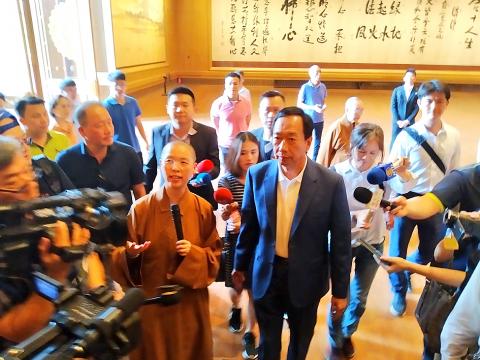Former Hon Hai Precision Industry Co chairman Terry Gou (郭台銘) yesterday accused Want Want Group chairman Tsai Eng-meng (蔡衍明) of being a “hatchet man” for China’s Taiwan Affairs Office (TAO).
Gou, who resigned on Friday last week as company chairman to pursue the Chinese Nationalist Party’s (KMT) nomination for next year’s presidential election, made the claim when leaving Kaohsiung’s Fo Guang Shan Buddha Museum to visit the Fo Guang Shan Sutra Repository.
A reporter with the Want Want Group-owned CtiTV had asked him if he was “truly unafraid” of the Chinese threat, and whether a comment that Gou made on Tuesday during the KMT’s first televised forum — “Who is afraid of whom?” — still held true.

Photo: Hung Ting-hung, Taipei Times
“Do not ask this type of question,” Gou said, adding after a pause: “A media controlled by the TAO has no right to ask me.”
“Ask your own conscience: Are you for the Republic of China or for the TAO?” he said.
“Ask your boss Tsai, the TAO’s hatchet man and a sycophant,” he added.
Later, after Gou visited Fo Guang Shan’s Master Hsing Yun (星雲法師), the CtiTV reporter asked him if he had any evidence that the media outlet was controlled by the TAO.
Gou said his comments had been directed at the media head, not at the reporter, and requested the reporter to not discuss the matter at a religious site.
CtiTV said it had no comment about “a presidential candidate with no love and no tolerance.”
Gou told reporters that he had asked the Buddhist master how to give Taiwanese confidence, happiness, hope and convenience.
The master told him he would be able to achieve it by acting on his words, Gou said, adding that the master also told him to be pragmatic and honest, and to lead by example.
Additional reporting by Hung Su-chin

The High Prosecutors’ Office yesterday withdrew an appeal against the acquittal of a former bank manager 22 years after his death, marking Taiwan’s first instance of prosecutors rendering posthumous justice to a wrongfully convicted defendant. Chu Ching-en (諸慶恩) — formerly a manager at the Taipei branch of BNP Paribas — was in 1999 accused by Weng Mao-chung (翁茂鍾), then-president of Chia Her Industrial Co, of forging a request for a fixed deposit of US$10 million by I-Hwa Industrial Co, a subsidiary of Chia Her, which was used as collateral. Chu was ruled not guilty in the first trial, but was found guilty

DEADLOCK: As the commission is unable to forum a quorum to review license renewal applications, the channel operators are not at fault and can air past their license date The National Communications Commission (NCC) yesterday said that the Public Television Service (PTS) and 36 other television and radio broadcasters could continue airing, despite the commission’s inability to meet a quorum to review their license renewal applications. The licenses of PTS and the other channels are set to expire between this month and June. The National Communications Commission Organization Act (國家通訊傳播委員會組織法) stipulates that the commission must meet the mandated quorum of four to hold a valid meeting. The seven-member commission currently has only three commissioners. “We have informed the channel operators of the progress we have made in reviewing their license renewal applications, and

Taiwan People’s Party (TPP) Chairman Huang Kuo-chang (黃國昌) yesterday appealed to the authorities to release former Taipei mayor Ko Wen-je (柯文哲) from pretrial detention amid conflicting reports about his health. The TPP at a news conference on Thursday said that Ko should be released to a hospital for treatment, adding that he has blood in his urine and had spells of pain and nausea followed by vomiting over the past three months. Hsieh Yen-yau (謝炎堯), a retired professor of internal medicine and Ko’s former teacher, said that Ko’s symptoms aligned with gallstones, kidney inflammation and potentially dangerous heart conditions. Ko, charged with

Taiwan-based publisher Li Yanhe (李延賀) has been sentenced to three years in prison, fined 50,000 yuan (US$6,890) in personal assets and deprived political rights for one year for “inciting secession” in China, China's Taiwan Affairs Office spokesman Chen Binhua (陳斌華) said today. The Shanghai First Intermediate People’s Court announced the verdict on Feb. 17, Chen said. The trial was conducted lawfully, and in an open and fair manner, he said, adding that the verdict has since come into legal effect. The defendant reportedly admitted guilt and would appeal within the statutory appeal period, he said, adding that the defendant and his family have